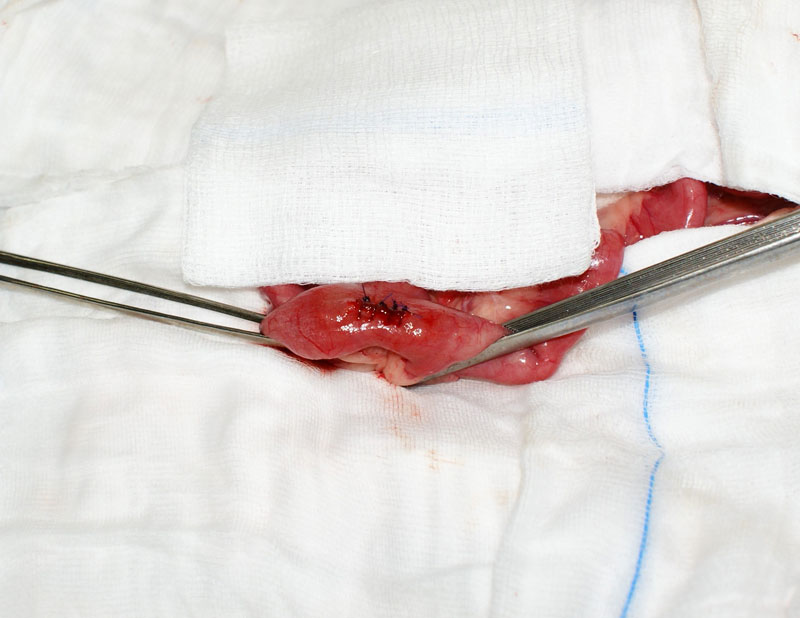Why Should I Bring my Pet to Willows for Gastrointestinal Biopsy?
Willows is one of Europe’s leading small animal referral centres. Our state-of-the-art hospital is led by internationally renowned Specialists, committed to providing the highest standards of veterinary care. The diagnostics and decision making leading to gastrointestinal biopsy can be complex, our team of Medicine Specialists at Willows are well placed to decide if and when a biopsy may be beneficial to a patient.
Following the decision to proceed with a gastrointestinal biopsy our multi-disciplinary team of Specialists in Anaesthesia and Soft Tissue Surgery will take over the management and care of the patient. Willows also has a large dedicated team of Vets, Nurses and clinical support staff available 24 hours a day, every day of the year to provide the best possible care for your pet.
When is a Gastrointestinal Biopsy Necessary?
A number of gastrointestinal disorders occur in dogs and cats, obtaining tissue samples (biopsies) from the stomach and/or intestine for analysis can provide a diagnosis and guide treatment.
There are many conditions that indicate that a biopsy of the stomach and intestine should be performed. The Specialist Vet caring for your pet will discuss the potential benefits of biopsy with you if they feel that this could be a beneficial part of the diagnostic investigations.
It may be sufficient to obtain superficial biopsies from the lining of the stomach and intestine with the guidance of a camera (endoscopic biopsy) however there are limitations to this approach. The advantage of surgical biopsies is that they obtain a full thickness sample of the stomach and/or intestine meaning that all of the tissue layers can be closely analysed which often provides more information about the underlying disorder. Surgery also allows for the biopsies to be obtained from areas that appear abnormal, meaning they are more likely to be useful, and allows for larger samples to be obtained.
What does Gastrointestinal Biopsy Surgery Involve?
Surgical biopsies of the stomach and intestine are usually obtained via a routine abdominal incision. The abdomen is opened and the organs within the abdomen are thoroughly inspected.
Biopsies are usually obtained from several sites along the gastrointestinal tract in order to maximise the likelihood of obtaining representative tissue samples and reaching a diagnosis. Any additional abnormalities, such as an irregular liver or enlarged lymph nodes, may prompt biopsy of these structures at the time of surgery in order to gain as much information as possible. The gastrointestinal biopsy sites are closed with absorbable stitches (Fig 1). The abdominal incision is closed with stitches which are most likely to be internal and therefore do not need to be removed. Occasionally, stitches or staples may be placed in the skin and these will need to be removed by your Vet seven to ten days after surgery.
Fig 1: Surgical intestinal biopsy site

What are the Risks of Surgery?
The stomach and intestine contain food (undigested and digested) along with a significant number of bacteria which are vital for the normal functions of the gastrointestinal tract. If the gastrointestinal contents were to leak from the stitched biopsy site then gastrointestinal contents and bacteria enter the abdomen which results in a serious condition known as septic peritonitis. Fortunately, this is a rare occurrence, however it is important to be aware of this as septic peritonitis can be life threatening and requires immediate veterinary intervention so that surgery can be performed to address the leaking biopsy site. The risk period for leakage from a gastrointestinal biopsy site is between three and five days after surgery, when the healing tissue is weakest.
Some dogs are kept in the hospital for five days after surgery for close monitoring if there is a perceived increased risk of leakage from the biopsy sites. Most pets will be discharged from the hospital a couple of days after the procedure for monitoring at home, it is important that veterinary advice is sought if any signs that may be suggestive of leakage from the biopsy sites develop (see below).
What can I Expect if my Pet is Undergoes a Gastrointestinal Biopsy?
Your pet will need to be adequately rested at home whilst the abdominal incision heals. Pets will need to be monitored closely for the development of signs that may suggest problems with healing. Signs which may be suggestive of leakage at a biopsy site include lethargy, reluctance to eat and vomiting. These signs can however be observed due to other reasons so don’t panic if they develop. It is strongly recommended that veterinary advice is sought immediately so that assessment of your pet can be arranged if deemed appropriate.
It is important to note that your pet may be subdued with a reduced appetite when first returning home from the hospital. These signs are expected to improve over the first couple of days at home. We are most concerned if a pet who was initially bright with a good appetite becomes lethargic and disinterested in food (with or without vomiting) a few days after surgery as this may be consistent with biopsy site leakage.
The biopsy samples are submitted to an external laboratory for histopathological analysis (a detailed inspection of the cells under a microscope). The tissue needs to be ‘fixed’ in a preservative solution for a period of time before it can be prepared for analysis. Consequently, we typically receive biopsy results five to seven days after the sample has been taken.
Gastrointestinal biopsy is a diagnostic procedure and so the prognosis depends on the diagnosis that is reached after the biopsy samples have been analysed at the laboratory. Your Specialist Vet will discuss the biopsy result with you in detail along with the prognosis and any treatment that may be subsequently required.
To save this page as a PDF, click the button and make sure “Save as PDF” is selected.
Soft Tissue Surgery
Find out more
To assist owners in understanding more about Soft Tissue Surgery we have put together a range of information sheets to talk you through the some of the more common soft tissue conditions seen and treated by our Specialists.
Condition:
Treatment:

